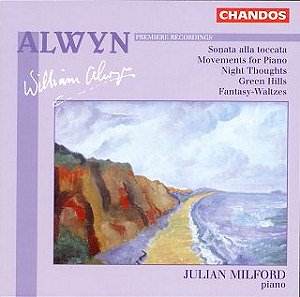William ALWYN
Fantasy-Waltzes
 music for piano performed
by Julian Milford
music for piano performed
by Julian Milford
 Chandos CHAN 9825
[69:44]
Chandos CHAN 9825
[69:44]
Crotchet
Amazon
UK Amazon USA

Chandos continue the excellent William Alwyn edition with a programme clearly
divided in two. The later part of disc, comprises the suite of 11
Fantasy-Waltzes of the title, a work previously recorded by Chandos
in 1985 by John Ogdon. The first 34 minutes are given over to 4 premiere
recordings. The works, which span the period 1935-61, are not presented in
chronological order. The earliest piece, The Green Hills, is a short
nature fantasy, misty water colours which conjure visions akin to Bax in
northern reverie. Night Thoughts, written 4 years later evokes similar
far away moods, the main theme being marked 'like distant trumpets', though
this is music written in reflection of fire watching patrols at the beginning
of WWII. Sonata alla toccata comes from the other end of the war,
1945-6, though it was not premiered until the Cheltenham Festival of 1953.
Alwyn noted that the piece was written for 'sheer enjoyment', and it is surely
not going too far to suggest also in relief and celebration at the end of
the conflict. Certainly the work opens with what sounds as if it might be
the introduction to a hymn of thanksgiving, before immediately rushing off
into a playful and uninhibited dance. The title says it all, Maestoso
- Allegro ritmico e jubilante. The central andante is necessarily more
sober, even sombre, a reflection perhaps on those who did not make it through
the preceding years. The finale, Molto vivace is a real carnival,
with a splash of various dances and rhythms working towards a colourfully
triumphant and forward-looking resolution.
Movements for Piano investigates very different territory over its
quarter-of-an-hour. The piece comes from 1961 and is far more unsettled and
introspective than the works outlined above. The end of Alwyn's first marriage
and the stress of London life had contributed to a breakdown and an inability
to compose. This work is part of a journey back towards the light, towards
music again. It is therefore a necessarily more romantic work in every
sense. There is a continuously dark and questing spirit in the rushing, turbulent
waters of the Allegro appassionato. The dark brooding of the early
hours captured in evocation, hazy tone colours suggesting the territory
of such works as Autumn Legend, the uneasy scoring as close to musical
neurosis as Alwyn comes, while the title of the finale, The Devil's Reel
itself says much. Music indeed for a satanic dance, relentless, involuted
and merciless, the angry finale suggesting a bold return to life. A triumph,
but for whom?
The Fantasy-Waltzes date from 1956-7, inspired by a visit to Grieg's
lakeside home. Almost certainly Alwyn's best known piano music, this is a
dazzling showcase, a work of constant invention which runs the gamut of moods
and styles, yet is always unmistakably Alwyn. The pieces do stand alone,
even though some end in disconcertingly flippant ways, but become more than
the sum of the parts when heard as part of the complete structure. This is
a kaleidoscope, a sustained and thoroughly enjoyable work with all the drama,
colour and atmosphere one expects from Alwyn. Underneath it all is a smile,
the warmth of a romantic who also knew how to have fun, both facets woven
together in the spectacular twists and turns of the closing Presto.
It will come as no surprise too learn that this Chandos recording has the
sumptuous recorded sound which suits the English romantics so well. Likewise,
the relatively unknown - i.e., he hasn't made lots of CDs - soloist Julian
Milford acquits himself splendidly, capturing the atmospheric textures essential
to such music well, yet equally adept at meeting the demands of the more
rhythmically florid and technically challenging dances. This isn't repertoire
in which to make a big name for oneself, after all, it's English music, and
who cares about that? - so congratulations are due all round to Chandos for
continuing to champion Alwyn and to Julian Milford for a thoroughly engrossing
recital.
Reviewer
Gary S. Dalkin

